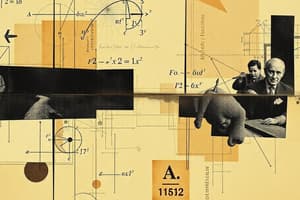Podcast
Questions and Answers
What is the purpose of factorisation in mathematics?
What is the purpose of factorisation in mathematics?
- To complicate simple expressions
- To simplify complex expressions (correct)
- To introduce more variables into an expression
- To change the values of variables in equations
In algebra, what do variables like x, y, and z represent in equations?
In algebra, what do variables like x, y, and z represent in equations?
- Nothing in particular
- Unknown quantities (correct)
- Known constants
- Operations to be performed
What is the main focus of algebraic expressions?
What is the main focus of algebraic expressions?
- Solving word problems
- Only numbers without variables
- Combination of variables, numbers, and operations (correct)
- Exclusively operations without numbers
How does factorisation differ from solving equations in algebra?
How does factorisation differ from solving equations in algebra?
What is the core purpose of algebra in mathematics?
What is the core purpose of algebra in mathematics?
How can factorisation help in solving quadratic equations?
How can factorisation help in solving quadratic equations?
What is the significance of factorisation in finding the GCD of two numbers?
What is the significance of factorisation in finding the GCD of two numbers?
In what fields are algebra and factorisation essential according to the text?
In what fields are algebra and factorisation essential according to the text?
What do algebra and factorisation provide according to the text?
What do algebra and factorisation provide according to the text?
How does factorisation help simplify expressions according to the text?
How does factorisation help simplify expressions according to the text?
Flashcards are hidden until you start studying
Study Notes
Math: Exploring Algebra and Factorisation
Algebra and factorisation are two essential tools in the mathematics toolbox that open the door to understanding a wide variety of concepts. Let's dive into these fields and discover their importance.
Algebra
Algebra is a branch of mathematics that deals with the manipulation of symbols, expressions, and equations. It builds upon the foundations of arithmetic and takes them to a more abstract level. In algebra, we learn to solve equations, represent relationships, and work with symbols to solve problems.
An equation in algebra typically has variables, like x, y, and z, which represent unknown quantities. For example, 2x + 3 = 11 is an equation in which x is the variable. Equations can also involve arithmetic operations, such as addition, subtraction, multiplication, and division.
The core of algebra is in solving equations for specific values of variables, which leads us to the concept of algebraic expressions. An expression is a combination of variables, numbers, and operations. For instance, 3x + 5 is an expression.
Solving equations allows us to find the values of variables that satisfy the relationship between the terms in an equation. This can help us answer questions or make predictions based on relationships between variables.
Factorisation
Factorisation is the process of breaking down an expression into its simplest factors. For example, the expression 36 can be factored as 6 * 6. Factorisation is a powerful tool in algebra because it can help simplify expressions and reveal the underlying structure of equations.
Factorisation is particularly useful in solving quadratic equations, which are equations of the form ax^2 + bx + c = 0, where a, b, and c are constants. By factoring the quadratic expression ax^2 + bx + c, we can often find its roots (the values of x that make the equation true) more easily.
Factorisation is also useful for finding the greatest common divisor (GCD) of two numbers. The GCD is the largest integer that divides both numbers evenly. For example, the GCD of 12 and 18 is 6. Factorisation can help us find the GCD by factoring the numbers and looking for common factors.
Applications
Algebra and factorisation are not just abstract concepts. They have numerous applications in everyday life and diverse fields. For instance, they are essential in:
- Engineering, where they help solve problems related to mechanics, electricity, and other disciplines
- Finance, where they aid in understanding interest, loan payments, and investments
- Science, where they aid in understanding phenomena such as motion, force, and energy
- Art and design, where they aid in understanding geometric relationships and patterns
- Business, where they aid in understanding profit, loss, and operational costs
Conclusion
The fields of algebra and factorisation are fundamental to understanding and solving problems in mathematics. As you delve deeper into these concepts, you'll find that they provide a powerful and flexible toolkit for tackling a wide variety of problems in many different fields. So, put on your thinking cap, and get ready to explore the world of algebra and factorisation!
Studying That Suits You
Use AI to generate personalized quizzes and flashcards to suit your learning preferences.




